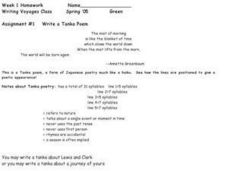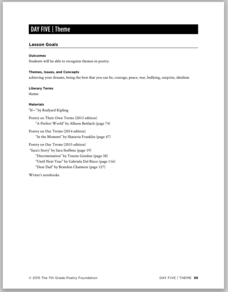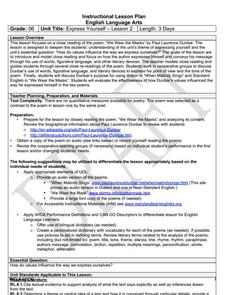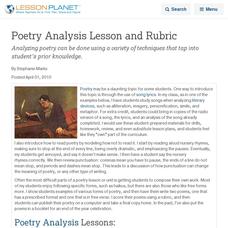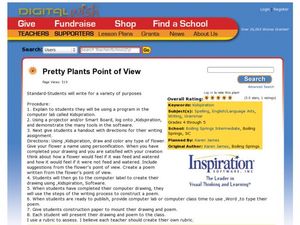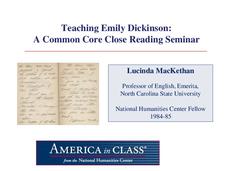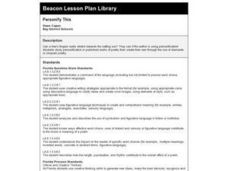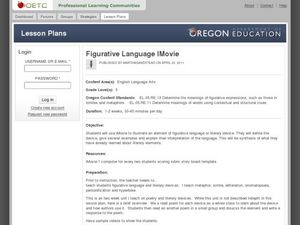Curated OER
Personification Lesson Plans and Resources
This resource on personification provides three different approaches aimed at different levels. The first, appropriate for upper elementary, provides examples of personification, followed by an exercise that requires replacing a word in...
Curated OER
Extreme Poetry Vocabulary
Challenge your class with this comprehensive list of literary vocabulary words. Learners take a pre-test, look up definitions, come up with an example, and then take a post-test. You might use this prior to a unit about poetic devices in...
Curated OER
Epic Poetry: Literary Terms for Story Analysis
What do Star Wars, Indiana Jones, and The Odyssey have in common? Why, they are all epics, of course, and are presented here as examples of the literary term. If you are beginning a study of epics, consider previewing the terms included...
Curated OER
Write a Tanka Poem
In this Tanka poem worksheet, 6th graders analyze a Tanka poem for number of syllables and content parameters, then write one about a journey, real or imagined using the 6 step writing process.
Curated OER
Poetry Writing Practice
For this poetry writing worksheet, students identify the topic, similes, metaphors, onomatopoeia, rhyme scheme, and alliteration in a poem. Students fill out this information in a given diagram.
Curated OER
Making Objects Human
Explore poetry, personification, and multiple languages with a poetry reading and writing activity. After the teacher reads the poem to the class, a discussion about personification follows. The class then writes a collaborative poem...
Curated OER
Theme
A study of Rudyard Kipling's poem, "If," launches a lesson about theme. Class members read Kipling's poem and poems by other seventh graders to identify the themes.
Soft Schools
Practice Reading Poetry
Identify the rhyme scheme in a worksheet that features "Mary Had a Little Lamb." Readers use the nursery rhyme to reinforce poetic elements in four comprehension questions.
Curated OER
6th Grade: Express Yourself, Lesson 2: Close Read
The second lesson plan of a pair about Paul Laurence Dunbar, this plan focuses in particular on his poem, "We Wear the Masks." After a short historical introduction, class members conduct a series or readings, marking up the text and...
Curated OER
Poetic Devices
Introduce middle schoolers to poetic devices with a lesson that asks them to find examples of alliteration, anaphora, onomatopoeia, metaphors, similes, and personification in various poems. Young scholars craft examples of these poetic...
Curated OER
Poetry Group Activity
In this Romeo and Juliet worksheet, learners complete a group project by creating a poem on an assigned topic relating to themes found in Romeo and Juliet.
Curated OER
Poetry Analysis Lesson and Rubric
Analyzing poetry can be done using a variety of techniques that tap into student's prior knowledge.
Curated OER
Pretty Plants Point of View
Young poets use Kidspiration to draw a flower, personify the flower, and write a poem from the flower's point of view. Sharing these poems in small groups will reinforce learners' knowledge of personification.
National Humanities Center
Teaching Emily Dickinson: A Common Core Close Reading Seminar
Three of Emily Dickinson's poems, "I like to see it," "Because I could not stop for Death," and "We grow accustomed to the Dark," provide instructors with an opportunity to model for class members how to use close reading strategies to...
Curated OER
Searching for Images in Poetry
Young scholars are introduced to the concepts of similes, metaphors and personification. In groups or individually, they read different poems identifying the similes, metaphors and instances of personification in each. They record all...
Curated OER
Figurative Language in Poetry and Prose
Students examine the impact of sound devices in poetry. In this poetry lesson, students read the listed poems and identify uses of hyperbole, simile, metaphor, imagery, and personification. Students discuss how sound devices enhance poetry.
Curated OER
Poetry Elements
Need a quick review of some of the elements of poetry? Eleven key terms are defined and illustrated.
Curated OER
Expressing Our Thoughts Through Poetry
Students create a poem on about spring. They read final version of their poem chorally. They write reflections of their experience in creating the poem.
Curated OER
Figurative Language #2
Identify figurative language in sentences that have been pulled out of a text. Looking at the sentence independently, can you tell which technique is being used? How do you know? Ninth graders look at 10 sentences that show simile,...
Curated OER
A Voice for Hard Issues
Ouch! The final lesson in the 12-resource poetry unit models for young writers how poems can be used to voice hard truths.
MENSA Education & Research Foundation
Magical Musical Tour: Using Lyrics to Teach Literary Elements
Language arts learners don't need a lecture about poetry; they listen to poetry every day on the radio! Apply skills from literary analysis to famous songs and beautiful lyrics with a lesson about literary devices. As class...
Curated OER
Personify This
Eighth graders study personification in published works of poetry, then create their own through the use of diamante or cinquain poetry. They read and discuss poetry by Shel Silverstein, William Jay Smith, and Elinor Wylie.
Curated OER
Carl Sandburg's "Chicago": Bringing a Great City Alive
Students examine the historical and cultural context in Sandburg's poem. The poetic devices of personification and apostrophe are utilized in the poem and identified by Students.
Curated OER
Figurative Language iMovie
In order to understand figurative language, learners read 5 poems, each exemplifying a different literary device. They discuss and write responses to each poem. They then choose one literary device which they will use as the basis for a...





